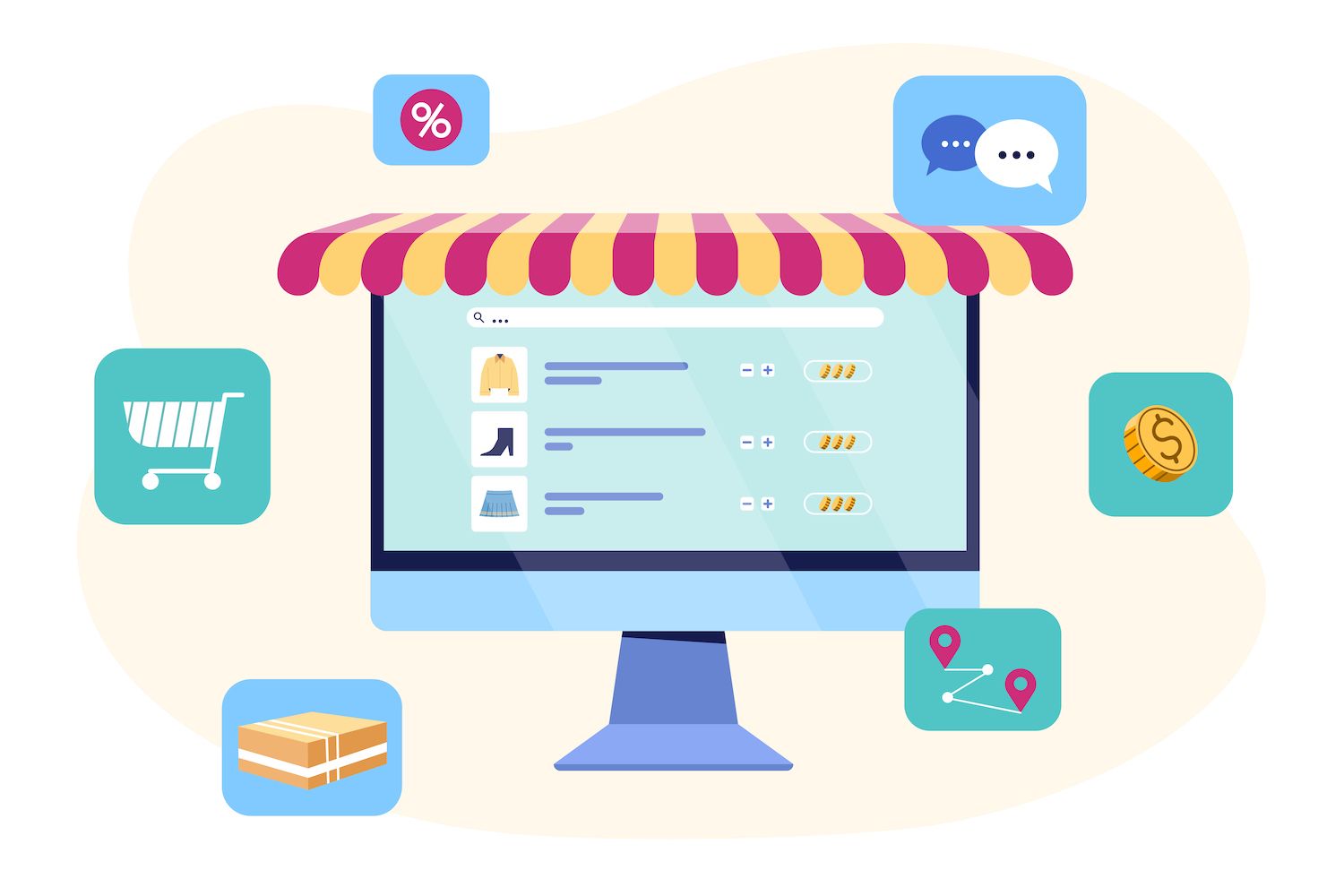Complete A-to-Z Checklist for Starting an Online Business
You're here! And that means that you're about to make a the biggest decision of your life. You're looking to establish your own online company. It might be an e-commerce enterprise, a service-based company such as a course or coaching enterprise, or anything else. But the biggest problem you'll likely face is: What do I do? In order to help you get going, we've put together the complete guideline for starting an online business.
Perhaps you're fed up of working for someone else, want to set your own hours and are tired of not having any control or influence on your pay. You're looking forward to taking a risk and experimenting with what you could build based on a concept for a product or business. It could be any of the above.
Whatever has led you to consider the idea of starting an online business, it's going to take some work You'll require direction.
There's good news, it doesn't require a university degree to be a successful business owner. Anyone determined to learn, work about business, make mistakes, and be consistent will be able to achieve this.
However, there's a lot to do, and that's why having a checklist for business online will be so helpful. works every day to democratize commerce, providing opportunities for everyone to pursue their ideas regardless of where they live and who they are and the resources they possess. We help people achieve success in the business world. is what we do!
Table of Contents
- Common questions from new business owners
- How much will it cost to launch an online-based business?
- How long will it take to begin?
- How long will it take to launch an ecommerce site?
- How can I begin an ecommerce business with no previous experience?
- Can I start an online business on a tight budget?
- Do you think it's a good idea to begin an e-commerce or online business?
- What do I need to know when I am starting an online or ecommerce enterprise?
- The ultimate checklist for online businesses
- Product development
- Documents from the government and legal
- Foundational business assets
- Website
- Set up business systems and operations
- Marketing
- Grab your checklist and begin working on the checklist today
The most frequently asked questions by entrepreneurs
The checklist for setting up an online company in a bit in the beginning, but before that, let's discuss some of the questions that arise when beginning an online company.

How much will it cost to begin an online business?
Starting an online business costs much less than starting a traditional company with a shopfront or manufacturing facility. However, there are several costs that you'll need to take into your budget before starting.
In the beginning, you need to create and publish your website. You can save costs by doing some of the work yourself, through the creation of your own web content as well as establishing an e-commerce company on a platform that is free like . Or, you can cut down on time and employ an agency or freelancer to handle it.
Then, there are legal costs, such as permits, business licenses, and possibly writing legal disclaimers depending on the product you sell. If you rent equipment, you may want a rental agreement written by a lawyer.
A different business expense is the accounting and tax preparation that includes paying sales tax. And you'll pay shipping costs for physical product, which can be accompanied by return shipping.
Therefore, even when you have an online company, there are going to be initial costs.
And if you're starting an ecommerce business that sells physical items, you'll need an additional cost for production, development of the product, as well as inventory.
What is the time frame to get started?
If you run an online business that doesn't offer physical goods, such as a coaching business or a service-based company like copywriting as well as web development, you can get started in a matter of months.
If you can devote several hours a day on your business idea, finishing off the items from your online business startup checklist and you'll be up and running much sooner than you think.
Working with physical products can make a difference of a couple of weeks or perhaps a few months, to this procedure. If you're manufacturing or customizing the products you create in-house you're only limited by how long it takes you to receive raw goods and finish your project. Working with manufacturers or other third party suppliers can add processing and shipping times to the process.
As with anything it is true that if the business you are starting is a side project that you are working on, the amount of time you need to dedicate to the development process is a limitation on how fast it can be launched.

What is the time frame to create an online store?
In the case of ecommerce companies that have packaging, products and associated requirements, start-up times can be extended. Setting up the ecommerce website is one of the final steps before opening for the business. Why? You need your processes and products analyzed in the beginning.
What options for shipping will you require? Which is your ideal customer want to purchase?
After you've got everything set up for the process of development, you'll be able to think through and outline the web pages you'll need and the functionality that it should have.
Creating and organizing all of the content for your site including product images, descriptions, FAQs, etc. -- can take several hours. It is important to have these items set up prior to hiring an agency or freelancer could make the process go much more quickly.
An experienced web developer can make a simple eCommerce site within just a few days. You should however anticipate the process to take around a week or two in the case of a standard online store. If you're building something more complex or do not have all of your content and functions arranged ahead of time, creating an eCommerce site could take several months or longer.
Do I have the ability to start an online business without prior experience?
Your learning curve may be more difficult However, if you're committed, it's absolutely possible!
If you're new to the business, it's wise to budget a little extra cash upfront to learn selling on the internet.
It's not necessary to have an official degree to be successful, but taking some online courses can help you get there faster. In some cases, it's worth making a small investment to learn from a professional or two. Why? Consider just some of the tasks you'll have to fulfill:
- Understanding marketing
- The process of writing a business strategy
- Learning how to sell
- Providing customer service
- Web content writing
- Acquiring leads
- Identifying manufacturing and inventory management
- Setting up a successful mindset
Do I have the ability to start an online company on the tightest budget?
Sure, you can. However, the likelihood is that you'll have to trade in your expenses in exchange for efficiency. If you're a good teacher and are able to teach yourself something new and possess an interest in doing so then you'll be able to learn the basics of website architecture as well as copywriting, design business structure, and marketing at your own pace.
Hiring experts to help with these things can speed up the process, but requires financial resources upfront.
The best strategy is to focus on your ecommerce or web-based business on your free time, in the form of a side-business, building it up a each day. You won't regret the amount of time spent educating yourself since in the end it will result in more educated, versatile, confident, and capable small business owners.
Stay patient, consistent, and persistent -- and you'll get back on track. Check out our list of things to know before starting an online company.
Do you think it's a good idea to start an ecommerce or online business?
Beginning an online store requires dedication. You won't find instant success. But if you keep working at it and don't give up, your new business will succeed.
Participate in a few seminars. Attend an expo or two, even though it's not within your field. Learn about how companies represent themselves, and the things they are doing. Learn the language. Meet individuals. Learn from your current job at someone else's business -The decisions that are made behind the scenes as well as the dangers, uncertainty, and the reason for why entrepreneurs do what they do. What can you learn from these experiences that you can apply for your own thoughts?
It's not a guarantee that you will succeed however it's recommended to take your time learning all you can. You should also take your dream a step further every day.
What are the most important things I should be aware of when starting an online or ecommerce company?
If you reached this point, well done!
You've already shown some commitment to your business idea as well as your eagerness to study all you can about becoming a business owner who is successful.
Now let's go through the list. The ultimate checklist to start an online business focuses on the essentials.

The complete checklist of online businesses
Learn more about each item on the checklist listed below. If you're writing your business plan, this checklist will assist in writing your document since it can make you think about the most important elements.
The checklist is divided into six parts:
- Product development
- Legal and Government
- Foundational business assets
- Website
- Systems for business and operations
- Marketing
This checklist doesn't have to be in a specific order, and you can work on many things at the same time, but make sure the business plan you're developing is established before investing too much in marketing, a business plan, and other assets. This is why we'll begin with 'Product.'
Product development
It's all about working out the product you're offering and how you're going to develop it to make it more accessible to customers regardless of whether it's the physical item, digital download, service, or anything else!
Be aware of the product you're selling
Are you selling products that are food-related? Hand-crafted jewelry? Clothing? Health supplements? Artwork that is custom-designed? The answer is obvious. However, you shouldn't begin a venture if you don't know the product you're selling.
If you're selling a service What is the product? Do you have a clear description of it? You can make money from video production, dog-walking events, planning an event and senior care design or any of a myriad of other services.
Or, maybe you offer cooking classes online or equipment rental, software licenses, printable workbooks, or tickets to performances. The options are endless!
Ultimately, what you offer must be sought-after or required by the customers. That's a great reason to start in tandem with the first task in the section on marketing of this list -identify and determine and discover your audience.
To do:Describe the products or services you're offering. Present these concepts to the members of your audience. seek feedback from them to improve your offering before investing too much into production or marketing.
Find out if your products are in demand
Wide product categories can be difficult to penetrate for the first time for a brand new online store or an online company that is just starting out. If you're looking to be noticed by potential customers, look to satisfy a demand that's not but being fulfilled by comparable firms. The term "health supplements" encompasses a variety of products. What about health supplements for parents working as freelancers?
You now have the benefit of a more specific, narrower and specific target market for your product. This is because, once you begin to market online, you will be based on the niche you have chosen to. It's much simpler to gain high-value traffic for a niche-based product or service than for general ones.
When you've got your product idea in mind, you need to do some research to determine the need for it. Examine the market. Are they flooded or do they lack an angle or service you can provide? Did a major competitor recently shut down or sell? Why? Could this mean that the demand for the product is low, or is this a great opportunity?
Again, make sure to make your suggestions known to those who are in your targeted group to determine their level of enthusiasm. In-person interviews can be conducted, conduct surveys via email or social media accounts and work with firms that can conduct research for you.
to do: Describe your niche and prove that there is a market for it.
Create a fulfillment and inventory plan
Prior to making orders, it is essential to stock up on inventory or an organized plan to meet demands. If you're selling physical items that means placing an order as well as sorting it out and keeping sufficient physical items to begin without the risk of having too lots of unsold inventory occupying the space of the garage or in your warehouse.
If you're in the business of sourcing and refining physical items, this procedure may take more time than you'd expect. Get started early with the initial variations of physical items and carefully inspect the quality and detail provided by the various vendors. Keep refining your source until you've reached the perfect equilibrium of quality, cost, and efficiency you're looking for.

In general, lower purchases from suppliers mean less margins. However, when you're first getting started, you can decide to use this method until you're sure which items will succeed and which aren't attracting customers in the way you'd like. If you are certain that the product has a chance to be a success it is possible to place larger purchases at lower prices per unit.
If you're selling service-based, or non-tangible goods however, you may still estimate your "inventory" based on any needed raw materials and the capacity of fulfillment. If you're selling a personal consultation for instance an inventory would be the total number of time you'll have to be working during the specified duration. Be sure to include the time needed for management of your business as well as marketing and other unexpected tasks!

Government and legal documents
This section is applicable to businesses based within the U.S. If you are located in a different country, spend some time researching the requirements.
Every state will have different requirements, but in general the following areas:
- A state business license
- A secretary of state corporate registration
- Federal tax identification (EIN)
- Insurance, depending on the product and service nature
- Legal disclaimers
- Legal contracts for customer-based or membership businesses
- Rental contracts for rental companies
A few of these are only one-time expenses. Some of them require renewal every year. And, for many of these documents, you'll need information, such as your company's name in the following section.
It is necessary to have an EIN in order to open the business account in a bank and you'll definitely be tempted to open, because it makes accounting and taxes far simpler to manage. Find your EIN here.
To do:Research all legal documents required for your jurisdiction and unique business. Include each document on the checklist and get everything in order!
Foundational business assets
It is also not an exhaustive list. Each business will have its own additional required assets. Consider the logistics of operating the business online you have in mind, and add items to this checklist of online business items according to the requirements.
Establish a brand that is known
Do not do it too fast. If you are considering registering your company with the secretary of state (in the United States), one important thing to do is ensure that your choice isn't already in use. Name your products and business is a major marketing choice.
The most effective method is to brainstorm a long list of ideas and reduce it to a few ideas. Perhaps run your top choices with a couple of your acquaintances or business associates. However, don't make a decision without ensuring there's no other name that's already been taken.
Conduct an internet search on the ideas you like best and check what comes up. Look up domain names to determine the if there is a comparable one accessible. Do you know of a site with a similar name? Your name needs to be unique and un-used. This article will help you name your business.
Create a brand identity and logo
After you've established your company name You can now begin to brand your items. It is essential to have a logo or some other symbol to symbolize your company's image. Here, you'll also choose the color scheme of your brand. You can change this at any time, but it's not necessarily easy to do take the time and effort into it. It's likely that you'll need to hire a professional to design your logo and provide overall branding suggestions.

Know the "why"
What ever product or service you'd like to offer through your store online, you need to have a personal reason for selling it. The goal is never to make money. Why? because you could earn money doing a lot of things. The reason you chose this business or product instead of the other ideas?
Perhaps you are interested within your field or already have the skills to can be applied. Maybe your current position, a hobby, or your previous work experience makes your more skilled to develop and market your product or service. Maybe you have some real knowledge in the area you are interested in. For coaching and industry-authority-based businesses, this is particularly helpful. Or, maybe you just have a passion for the subject.
No matter what, be aware of your motivation behind choosing the business or product you'd like to explore. You'll want to present the tale of your business. It is important to understand the motivation behind this in order to be able to recall the story when faced with challenges.
To Do: Write out a short paragraph explaining your motivations for choosing this business or product.
Create business contact options
It's fine to use free services for mailboxes like Yahoo or Gmail, but having an email at your own domain can boost your credibility and professionalism. Once you know your business name and the URL for your website, you can create a business email address that will be something like [email protected].
There is a possibility that you should create a company address, even if it's an office in your local area that you can use for commercial and professional mail.
Finally, consider a phone number that is specific to your business. This also shows a level of professionalism, and helps to maintain a a degree of separation between your business and personal life. Free tools like Google Voice help you get started quickly.
Establish a corporate bank account
It is essential to have a company bank account. It's a must. You absolutely do not want to mix your business finances and your personal finances. In order to open a corporate bank account, you'll need the federal tax identification number (EIN) as well as your business license, too. Check with your preferred bank for the specific documentation they require.
Website
Since you're starting an ecommerce shop, your site will be a key component of your venture. Although the procedures you'll have to follow here will vary based upon your business and the products that you're selling several commonalities for the majority of online stores.
Select a domain name
In the past, you have confirmed that your domain name is available. This is now the perfect moment to buy it. This is actually another factor in naming your business, as well. The ideal is that the .com name of your domain will be available for purchase, however, there are alternatives you can consider such as .org, .co, and .net according to your requirements.

Also, you want your URL to be simple to read and comprehend -- so that if you speak it to a potential customer and they are capable of remembering it and then typing the URL into their browsers when they need to.
Purchase Web Hosting
It is necessary to use a web hosting service to store your website files and allow users to browse online. There are a variety of factors to consider here, including prices, uptime, security offerings as well as scaling.
Pick an e-commerce platform
E-commerce tools provide all the features you require to list products online, accept payments, and more. This is a fantastic alternative for novices and professionals alike. It's the ecommerce component of WordPress it's a site-building tool that powers up to 43% of all web pages.
WordPress is superior to other platforms since they're:
- Use HTML0 for free. Both WordPress and provide all the core features of their website for no cost. Although you are able to purchase premium plugins, lots of shops can begin and run their business at absolutely no cost.
- Flexible and extendable. You're not limited! Have as many products and variations as you'd want. Sell any type of product that you can think of, from digital and physical items to bookings, subscriptions, and training courses. Create a site that is compatible to anything you could imagine.
- Open-source. As both WordPress as well as WordPress are open-source that means anyone is free to edit, copy, or change the code however they'd prefer. This means that there's an incredibly high level of transparency and flexibility. It also means that there aren't many of the limitations and restrictions that are associated from proprietary platforms.
- Simple to learn. These platforms were designed so that anyone can build an attractive, efficient website and that's even without programming experience whatsoever. As an example, the powerful blocks editor lets you create pages by simply moving and dropping elements (blocks) as well as setting up options.
- A part of a close-knit community. Its WordPress Community and the WordPress platform is unlike any other, with gatherings, Facebook groups, Slack channels forums for help, and so on. There are a lot of people that want to see everyone achieve happiness!

Create your own website
You can then get working on the remainder of your site. Stick with the branding decisions you've already made, including your logo and color scheme and ensure your online presence is cohesive. The block editor to create everything from pages and product galleries, to headers and even product templates (if you're using the block themes).

If you're running an online store, you'll likely need an About page, a home page, and Contact page, alongside cart, product categories, checkout pages, and Cart. This will also vary based on your business.
Make your own product
Now, you'll want to build your listing of products. By default, lets you create:
- Basic products (Basic items with no options)
- Variable product (Items with options, like colors and sizes)
- Product downloadable (Products that customers can download)
- Virtual products (Items which aren't physically tangible, but aren't downloaded, like an online service)

Yes, you need to include all technical specifications, material info, etc. Also, you should consider the potential customers will be asking and attempt to respond to them within the description.
But moreover, you need to create an image of how the features of what you're offering can benefit your customers' lives, work, play, and so on.
Install a payment processor
Payment gateways allow you to collect securely payments to purchase your products, and sends the funds to your bank account for business. There are a few points to take into account, however ultimately the gateway that you choose will depend on your business needs.

Create business systems as well as operations
Making the most of your profits as an enterprise means that you focus on efficiency, and establishing systems that are duplicatable which reduces the requirement to keep coming up with fresh solutions for your business model.

Establish the packaging and shipping procedures
There shouldn't be a need to be able to guess about packaging strategies whenever a new purchase arrives. Establish a systematic method for tracking down the SKUs you have in stock and how to wrap each item for shipping. It should be documented, organized process so that you could hire someone or at any time they could come in and take over this responsibility.
Certain products require bubble wrap. Some can be put in a bag. Certain combinations still require a box and should be accompanied by a sticker. These are all things you should consider before you start to sell online.
Determine shipping materials
Choose shipping partners and how you'll be charging to ship

Find out how to manage inventory and store it.
Without proper inventory management You'll be faced with numerous problems. It's impossible to sell items you don't have. Therefore, you want to keep plenty of inventory without having the possibility of a warehouse full of un-sold products.
If you're planning to store and ship items you have on-hand, you'll need a place to store the goods as well as anything needed to protect them and organize to make them easier for you to fulfill (bins and tubs, etc. ).
Consider the customer service process
How can questions be addressed? What options will the customer be able to contact? Do you have a standard procedure that you could develop for handling issues at varying scales of intensity?
Set up taxes and financial tracking
Most jurisdictions require the tracking and collection of some kind of sales tax, or VAT. This can vary depending on the location of the purchaser, the shipping destination as well as the location of your physical store inventory, and more. This can become complicated very quickly.
In addition to tax implications, as a business owner, you should know your financial position at any given time. And with numerous categories of expenditures, as well as a wide variety of obligations to be able to handle, it can be an overwhelming task to take care of.

If you are tax-paying at the time of your tax return, or the appropriate interval of your choosing, simply provide your accountant with the information you have provided and let them take it from there.
Create return policies
Marketing
The fact that you've put up an online store doesn't mean anyone will find it, let alone buy anything. The majority of marketers, as well being smart business owners can tell you that every business is in the business of marketing. Your business is to sell your goods, and that's marketing. Before you can find your spot by offering the highest quality, most unique or most expensiveitems the people must be aware of, comprehend the benefits, and feel compelled to purchase.
Marketing is the foundation of every business and it's for this reason that many of the key marketing principles in this section could, and ought to be developed in tandem with other aspects of this list. Your audience and how you plan to market your company should influence everything from your name and web presence to the SKUs you choose to develop.
Define and learn about your target audience
Are selling to a specific group of people, such as children parents, singles or retired or other people? Do you sell to a different business niche? Maybe you're selling on particular interests like landscaping or rock climbing. It could be based on a specific need.
Even with the need, other factors come into play. Everyone needs to eat. Everyone needs to put on clothing. But which food and clothes we choose depends a lot on personal preference, culture, life experience, how we were raised, the financial capability, etc.
Your target audience will determine your product in a certain degree, but the quality of your product will determine your target audience. You must consider both simultaneously.
When you've established the potential clients you're targeting, your marketing should be in line with that, and draw that audience out. For instance, if you're selling landscaping service to retirees, your marketing should be clear that your service is intended specifically for retired people, not just any other person. If you're selling landscaping services to retirement community, then that's a different audience.
Find out how to reach that audience
What next, is the best way to connect with your market? Do you prefer to use digital marketing? Do you plan to use print or in-person marketing too? Your target audience again will determine the answer to some extent.
As an example, when using this example, many retirement-age people aren't on TikTok therefore it doesn't make much sense for that firm to allocate all the advertising dollars to this platform. A makeup store selling to teens and college students might want to strongly think about advertising on TikTok and other social media platforms.
Where is your audience? What are their shopping habits? Where do they look for solutions to the issues that your product addresses? How else can you get the attention of your customers?

Set a marketing budget
Every online business must decide their initial marketing costs depending on their particular situation. You must consider:
- You have the funds available for investing upfront
- Costs associated with various marketing channels
- What you will do for yourself, and what will you outsource
- Your product's value
A product that sells for $500 requires a higher marketing budget than one selling at $5. It's at least the beginning. However, if that $5 product grows into a major seller then you could increase your cost of marketing for that item later.
It takes a lot more budget to produce a television commercial than it does to create an email marketing campaign. But you have to be able to create an email list for people to mail to, and that requires additional marketing efforts. Direct mail requires a list, too.
In-person events charge fees for booths. Pay-per-click (PPC) is a method of marketing online that charges for every click.
You must decide on the amount you're willing spend initiallyin order to attract, engage, and convert your first group of clients. When you begin to expand your business, the strategy and investment will shift.
Begin your digital marketing
- Display advertising
Each of these entails some learning curve as well as an investment of time and money. It is impossible to master all of them in the beginning.
Search engine optimization is among the lowest costs if you do it yourself However, it requires lots of time to comprehend how to research, implement, and study. However, if you're able to spare enough time to write, you can begin making blog posts, eBooks as well as checklists, guides as well as infographics and other marketing tools that are digital. Create them around the things your audience cares about.
Then, use them to convert visitors on your website to leads or customers. Invite them to join your email list with an opt-in form. This allows you to send email promotional messages which, once as always, you have the option to develop your own.
Other forms of marketing can cost more, but let you more rapidly and effectively target your ideal customers, enabling you to grow your company faster.
Consider in-person marketing strategies
One of the biggest challenges in digital marketing is all of the different digital marketing out there. The online world is full of distractions. In some cases, the best option is to get out there and meet people in person.

Get a booth at an industry event. Try getting a speaking slot to engage your audience in an authority position. You can organize your own event in your target audience, much like financial advisors. Participate in networking occasions. Join a local chamber of commerce.
The value of doing things like this goes far beyond selling immediately. There is much to be learned from every interaction. You will learn better ways to present yourself and your product.
Take a look at printed marketing strategies
Print marketing is a type of direct mail, which can include letters, postcards, and flyers. It is also possible to create small guides, books, and brochures.
It is possible to increase visitors to your website by including your website or a particular website URL on your printed material. The dedicated landing page strategy performs well since you are able to track how many people are using it and also know how well that technique is working.
Get your checklist out and begin working through it today
The process of starting an online store requires a lot of steps. But they're enough! We're here to assist, with all the tools needed to set up and run an online store.
Are you ready? Get started with today.
